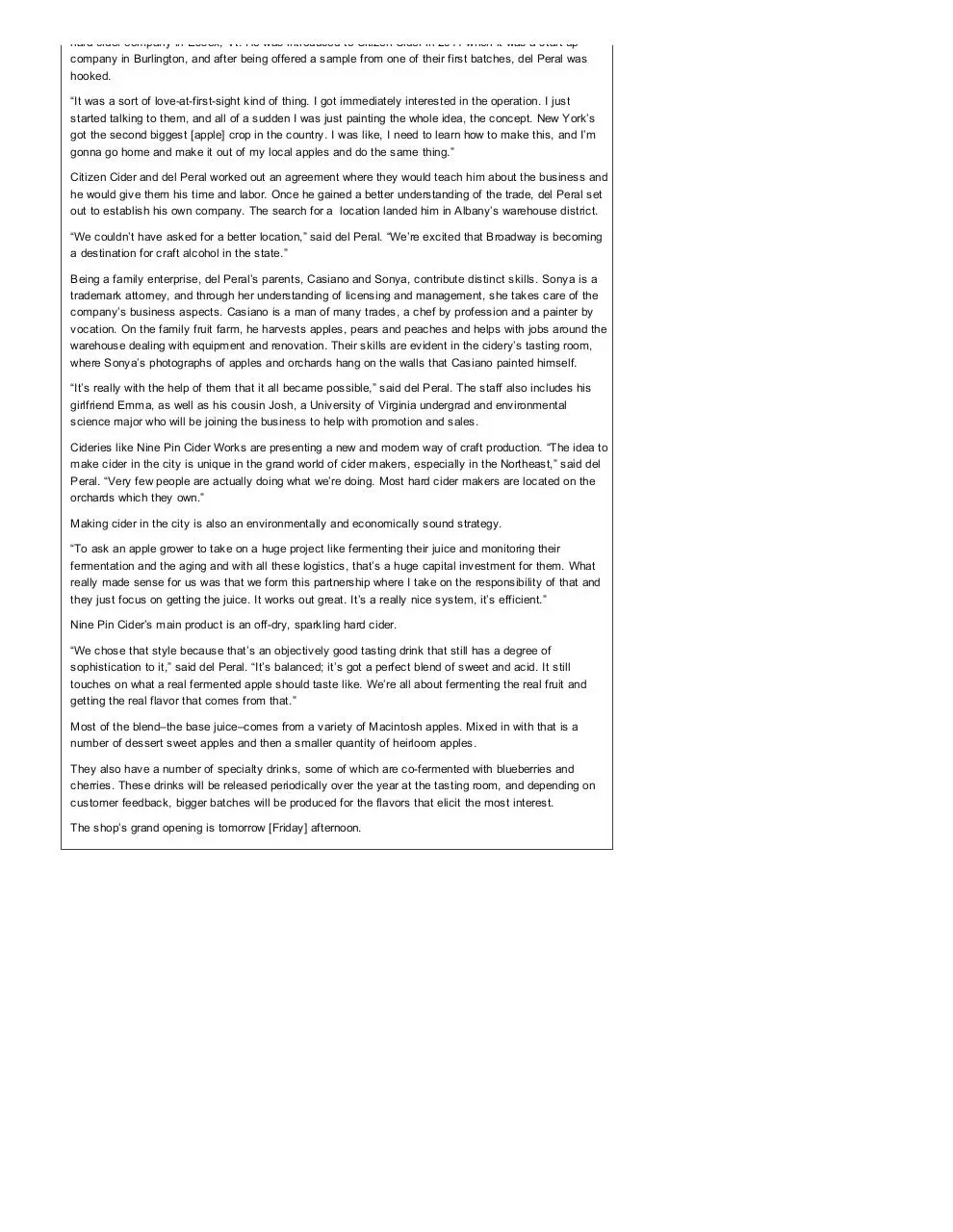Farm To Tasting Room — Metroland (PDF)
File information
This PDF 1.4 document has been generated by Chromium / Skia/PDF, and has been sent on pdf-archive.com on 01/03/2017 at 16:20, from IP address 199.168.x.x.
The current document download page has been viewed 269 times.
File size: 338.8 KB (2 pages).
Privacy: public file


File preview
F o o d & Drin k
News
View p o in t s
Guides
Blog
Arch ives
Classifieds
Art s & En t ert ain m en t
Farm To Tasting Room
The apple trees he grew up with are now contributing to Alejandro del Peral’s
Albanymade hard cider
by Era Bu sh a ti on Fe b ru a ry 2 7 , 2 0 1 4 · 1 co mme n t
0
Alejandro del Peral grew up in Columbia County surrounded by apple orchards on his family’s nineacre
fruit farm, where he worked throughout his childhood. But after living in California, Wyoming and his
native Spain, he never imagined that one day he would return home to New York and find his calling in
the hardcider business.
His company, Nine Pin Cider Works, located at 929 Broadway in Albany, is a newcomer to the local
craftalcohol scene. Founded by del Peral but run as a family business, the cidery moved into its current
facility in August, and now, seven months later, it is one day away from its grand opening.
In an interesting twist of fate, the warehouse sits in the shadow of a rose mural that del Peral’s father
painted on the side of the adjoining building 15 years ago.
On Oct. 17, 2013, Gov. Andrew
Cuomo signed the Farm Cideries
bill, which licenses cideries to
manufacture and sell hard cider with
the conditions that the annual
quantity does not exceed 150,000
gallons, and that the cider is made
exclusively from apple crops grown
in New York. In addition, the bill
excludes licensed farm cideries
from salestax information return
filing requirements.
If that was cause enough for
celebration, Cuomo also announced
Nine Pin Cider Works as the first
licensed farm cidery in New York
state. “We made history,” said del
Peral. “We’re very thankful.”
Alejandro del Peral photographed by Era Bushati
Before knowing whether the bill
would become law, del Peral had
already planned on exclusively
using locally grown apples. Nine Pin
Cider has partnerships with local
apple orchards Lindsey’s Idyllwood
Orchard in Rexford and Indian
Ladder Farms in Altamont. And del
Peral grew up with neighboring
Samascott Orchards in Kinderhook,
which provides about 95 percent of Nine Pin’s pressed apple juice.
“They are sort of our main squeeze, for lack of a better pun,” del Peral said with a laugh.
Nine Pin Cider also uses apples from the family fruit farm. One of their specialty ciders, the Cas
Special–named after del Peral’s father, Casiano–is primarily made from apples his father grows from
seed.
“My dad, about 20 years ago, started planting trees that were volunteers,” said del Peral. “They sprouted
up out of the compost or from under another apple tree and he would take them, put them in the ground
and then use his green thumb, embrace them and now we’ve got all these trees and many of [the apples]
kind of look nasty and they don’t taste very good, but they ferment into an interesting cider.”
The apples used in Nine Pin’s ciders are pressed at their respective orchards and then transported to the
Broadway facility for fermentation.
To make hard cider, del Peral relies on the training he received while an apprentice with Citizen Cider, a
hard cider company in Essex, Vt. He was introduced to Citizen Cider in 2011 when it was a startup
Perso n als
Pro m o s
Contact Us
hard cider company in Essex, Vt. He was introduced to Citizen Cider in 2011 when it was a startup
company in Burlington, and after being offered a sample from one of their first batches, del Peral was
hooked.
“It was a sort of loveatfirstsight kind of thing. I got immediately interested in the operation. I just
started talking to them, and all of a sudden I was just painting the whole idea, the concept. New York’s
got the second biggest [apple] crop in the country. I was like, I need to learn how to make this, and I’m
gonna go home and make it out of my local apples and do the same thing.”
Citizen Cider and del Peral worked out an agreement where they would teach him about the business and
he would give them his time and labor. Once he gained a better understanding of the trade, del Peral set
out to establish his own company. The search for a location landed him in Albany’s warehouse district.
“We couldn’t have asked for a better location,” said del Peral. “We’re excited that Broadway is becoming
a destination for craft alcohol in the state.”
Being a family enterprise, del Peral’s parents, Casiano and Sonya, contribute distinct skills. Sonya is a
trademark attorney, and through her understanding of licensing and management, she takes care of the
company’s business aspects. Casiano is a man of many trades, a chef by profession and a painter by
vocation. On the family fruit farm, he harvests apples, pears and peaches and helps with jobs around the
warehouse dealing with equipment and renovation. Their skills are evident in the cidery’s tasting room,
where Sonya’s photographs of apples and orchards hang on the walls that Casiano painted himself.
“It’s really with the help of them that it all became possible,” said del Peral. The staff also includes his
girlfriend Emma, as well as his cousin Josh, a University of Virginia undergrad and environmental
science major who will be joining the business to help with promotion and sales.
Cideries like Nine Pin Cider Works are presenting a new and modern way of craft production. “The idea to
make cider in the city is unique in the grand world of cider makers, especially in the Northeast,” said del
Peral. “Very few people are actually doing what we’re doing. Most hard cider makers are located on the
orchards which they own.”
Making cider in the city is also an environmentally and economically sound strategy.
“To ask an apple grower to take on a huge project like fermenting their juice and monitoring their
fermentation and the aging and with all these logistics, that’s a huge capital investment for them. What
really made sense for us was that we form this partnership where I take on the responsibility of that and
they just focus on getting the juice. It works out great. It’s a really nice system, it’s efficient.”
Nine Pin Cider’s main product is an offdry, sparkling hard cider.
“We chose that style because that’s an objectively good tasting drink that still has a degree of
sophistication to it,” said del Peral. “It’s balanced; it’s got a perfect blend of sweet and acid. It still
touches on what a real fermented apple should taste like. We’re all about fermenting the real fruit and
getting the real flavor that comes from that.”
Most of the blend–the base juice–comes from a variety of Macintosh apples. Mixed in with that is a
number of dessert sweet apples and then a smaller quantity of heirloom apples.
They also have a number of specialty drinks, some of which are cofermented with blueberries and
cherries. These drinks will be released periodically over the year at the tasting room, and depending on
customer feedback, bigger batches will be produced for the flavors that elicit the most interest.
The shop’s grand opening is tomorrow [Friday] afternoon.
Download Farm To Tasting Room — Metroland
Farm To Tasting Room — Metroland.pdf (PDF, 338.8 KB)
Download PDF
Share this file on social networks
Link to this page
Permanent link
Use the permanent link to the download page to share your document on Facebook, Twitter, LinkedIn, or directly with a contact by e-Mail, Messenger, Whatsapp, Line..
Short link
Use the short link to share your document on Twitter or by text message (SMS)
HTML Code
Copy the following HTML code to share your document on a Website or Blog
QR Code to this page

This file has been shared publicly by a user of PDF Archive.
Document ID: 0000562396.